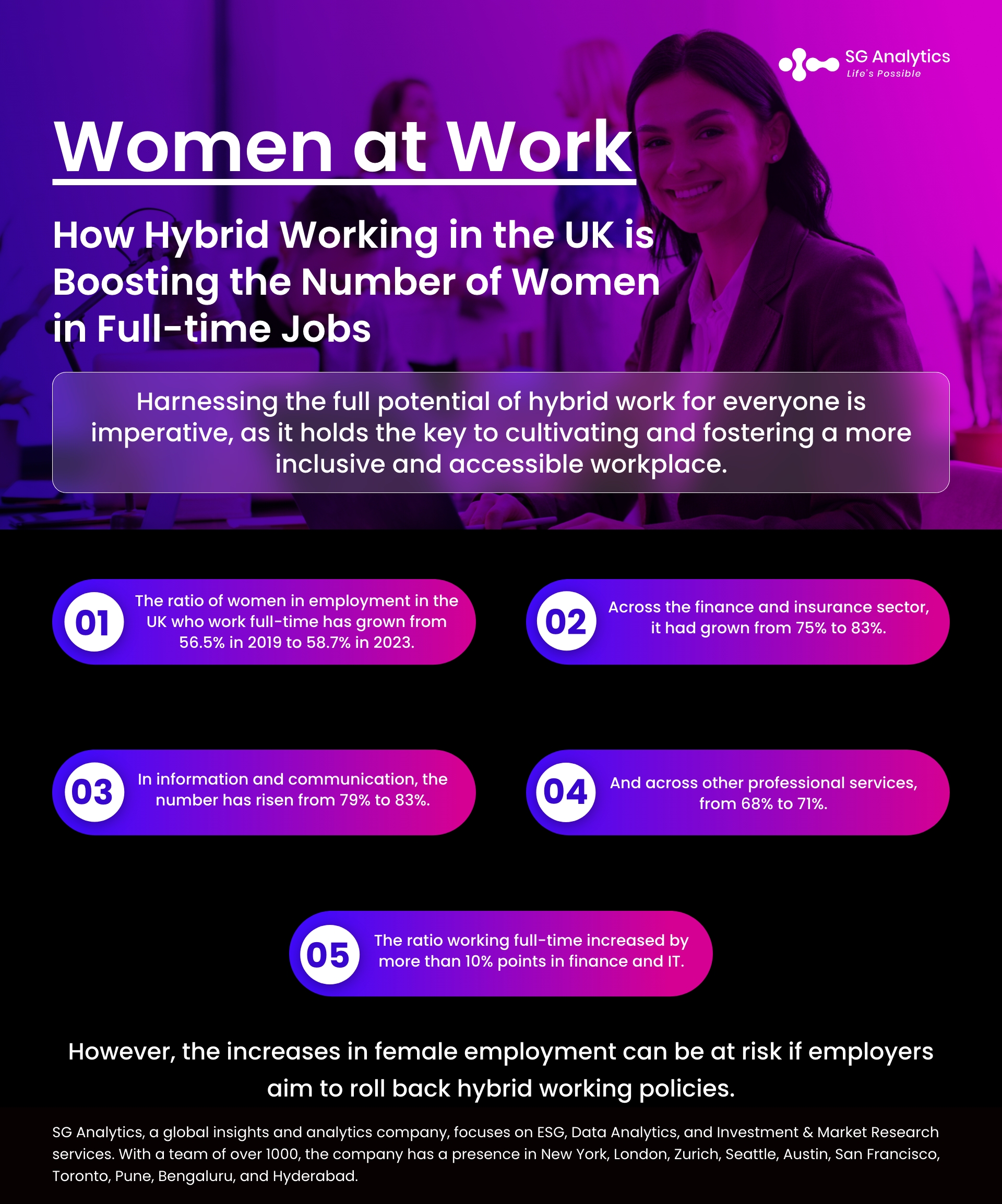Research based on official UK data demonstrated that professional women across the UK have increasingly opted to work full-time since the pandemic in sectors where hybrid, as well as remote working, have become the norm. This analysis presented by the Office for National Statistics microdata conducted by Public First - a consultancy firm- exhibits some of the strongest evidence to date, highlighting remote working individuals and broader economic benefits.
Professional women today are more likely to work full-time as hybrid and remote working has become a standard practice, as per the research issued by official UK data. The ratio of women in employment in the UK who work full-time has grown from 56.5% in 2019 to 58.7% in 2023. Public First found the increase had been much bigger across industries where organisations had adopted hybrid work policies.
Across the finance and insurance sector, the proportion of women working full-time had grown from 75% to 83%. In information and communication, the number has risen from 79% to 83%. And across other professional services, from 68% to 71%. This change was more evident for mothers, with the ratio working full-time increasing by more than 10% points in finance and IT.
The findings from Public First highlighted that the convincing evidence about hybrid work setup accelerated by COVID has proven beneficial for a chunk of the labour force that has high human capital.
Read more: UK Inflation - How is it Affecting the People?
While many reasons explain why mothers are working longer hours — including the cost-of-living pressures or fathers taking on more childcare — the research also presented a clear contrast between sectors where homeworking is easier.

Across lower-paid fields, there has also been an increase in the proportion of women on full-time hours in administrative and support services. However, there has been a sharp drop in hospitality, where labour shortages have compelled many employers to offer more family-friendly shifts.
The Business Case for Flexible Working
The introduction of a greater degree of flexible working within the organisation has led to a rise in demand for leadership buy-in, overcoming any negative attitudes, and effectively communicating the benefits of flexible working. This has helped organisations make a convincing case for adopting and fostering a flexible working environment. The creation of more flexible jobs and workplaces is playing an equally critical role in supporting economic growth and productivity. It has enabled organisations to capitalise on the full potential of their workforce.
The boost in women’s working hours has been all more important given the extent to which the UK’s overall workforce has shrunk since the beginning of the pandemic.
Read more: Data Consulting for Startups in the UK: Why it Matters and How to Get Started
Hybrid Working: The Key to Fostering Inclusive Workplaces
The paradigm shift in traditional workspaces due to the COVID-19 pandemic has resulted in remote work emerging as a dominant trend, directing human resources departments to pivot faster than ever before. This new trend has been shaping the professional world and working environments across the globe.
The post-pandemic surge in hybrid working has led to a rise in the number of professionally educated women in the UK - especially mothers. It has presented them with the opportunity to move back into full-time work. Flexible working setup is contributing to efforts to raise workplace productivity as well as job quality. It further possesses the potential to support employee motivation, innovation, well-being, and overall flexibility. The proportion of women in the UK in employment in full-time work has grown from 56.5% in 2019 to 58.7% in 2023.

One of the major benefits of remote work is flexible hours, equipping working professionals with the ability to organise work hours around their personal responsibilities and preferences. This has led to enhanced work-life balance and job satisfaction. With work-life balance emerging as a crucial aspect of employee well-being, remote work is making a positive impact. Remote workers, especially female employees, can achieve the right balance in their work and personal life.
This shift in the hybrid work model also reported a rise in average salary at different organisations. This can be attributed to the flexibility and balance that remote work offers, enabling employees to maximise their productivity and potentially take on more responsibilities.
Read more: UK Economy: Navigating Turbulent Waters
Hybrid working is expected to be worth £13.5 billion annually, with hybrid employees valuing the positive impacts on their work-life balance. The rapid growth of hybrid working and making recommendations on how the government responds to the rise in the practice has led to a further increase in the number of employment opportunities for women.
However, harnessing the full potential of hybrid work for everyone is imperative, as it holds the key to cultivating and fostering a more inclusive and accessible workplace. Many employers have embraced this model, and it is evident that this intervention is providing comprehensive guidelines and support to enable organisations to unlock the advantages of hybrid and remote work. With the hybrid work modes, women who can work from home are more likely to embrace full-time employment than those who have to work away from home. The industry data has highlighted that there has been a large increase in the share of women in professional services, including banking and other professional services, working full-time.
Future of Hybrid Work
The increases in female employment can be at risk if employers aim to roll back hybrid working policies as the labour market is weakening and staff is becoming less able to demand flexibility. The commission discovered that three-quarters of hybrid workers felt it enhanced their work-life balance, and 70% of working women with children under 18 expressed that this made juggling their responsibilities easier.

However, most employers working with hybrid work arrangements are not convinced that it boosts their work productivity. The commission further highlighted that this perception gap could be enough to stunt the ability of businesses in the UK to maximise the benefits of hybrid and remote work.
Read more: 15 Strategies Redefining Success for UK SMEs
Final Thoughts
A large majority of employers offering hybrid work have helped in the hiring and retention of staff. Businesses are estimating that they saved between £6.9-£10.3 billion annually in their recruitment process costs alone due to improved retention rates because of hybrid working.
Additionally, businesses found that hybrid and remote working have made it easier for their hiring teams to employ from a wider scope of backgrounds. Most businesses are finding it helpful to hire more individuals from different regions of the country. This has also led to a significant increase in hiring people with disabilities.
SG Analytics, recognized by the Financial Times as one of APAC's fastest-growing firms, is a prominent insights and analytics company specializing in data-centric research and contextual analytics. Operating globally across the US, UK, Poland, Switzerland, and India, we expertly guide data from inception to transform it into invaluable insights using our knowledge-driven ecosystem, results-focused solutions, and advanced technology platform. Our distinguished clientele, including Fortune 500 giants, attests to our mastery of harnessing data with purpose, merging content and context to overcome business challenges. With our Brand Promise of "Life's Possible," we consistently deliver enduring value, ensuring the utmost client delight.
A leader in Market research, SG Analytics enables organizations to achieve actionable insights into products, technology, customers, competition, and the marketplace to make insight-driven decisions. Contact us today if you are an enterprise looking to make critical data-driven decisions to prompt accelerated growth and breakthrough performance.









